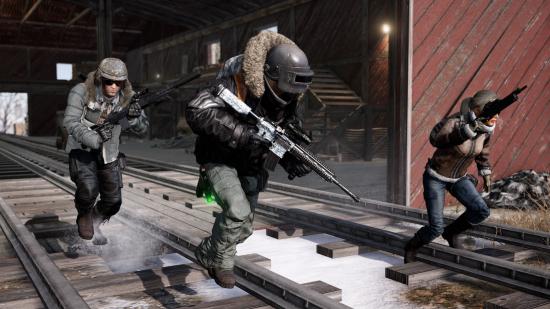PlayerUnknown’s Battlegrounds has been dealing with cheaters since the beginning of its massive popularity, and PUBG Corp has taken an aggressive approach to pursuing hackers – going so far as to help regional law enforcement track down and arrest the creators and purveyors of hacking tools. A new video produced by the company provides a peek at the teams and people involved in fighting cheating in the game.
The video is a (somewhat sterile) rundown of PUBG Corp’s anti-cheating efforts. Dohyung Lee, the head of PUBG’s Anti-Cheat Unit, and Wonha Ryu, Anti-Cheat operations manager, explain a few of the broader concepts and approaches they use in the process of identifying cheaters and hacking tools as new methods arise.
According to the video, PUBG’s Anti-Cheat Unit relies on a combination of internal tools and player reports to identify cheating trends. Once a hack is identified, the team will find the third party hacking tool or device that’s being used to facilitate the cheat. Engineers will then work to deploy countermeasures into the game, while another team imposes sanctions on players using the tool – usually in the form of bans.
Here’s the full video:

The Anti-Cheat Unit also has an analysis team that uses machine-learning techniques to develop algorithms to help identify cheats faster. With so much data available to review in each match, there’s plenty for an AI to work with.
The video also touches on the Anti Cheat Unit’s collaboration with what Ryu calls “international partners.” These are, it seems, law enforcement organizations that use PUBG Corp’s data on hacking to identify, arrest, and prosecute people creating and selling illegal software.
Read more: PUBG now has an Apex Legends-style ping system
Dongwan Kim, one of PUBG’s anti-cheat engineers, says the company is also using machine-learning techniques to help make PUBG a tougher game for cheaters to develop hacks for to begin with.
“Cheat developers will always evolve their techniques to try to get around ours,” he said. “So we recently created a very sophisticated technical response that makes it more difficult for offenders to develop illegal programs, such as encryption of pointer and memory, virtualization of codes, section shuffles, and more.”
That may sound complicated, but the theory seems to be that it’s harder to hit a moving target – which is certainly a principle that holds true in PUBG itself.
